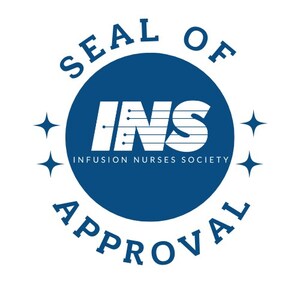Patients Are at Risk for Accidental Dislodgement of IV Catheters, Study Shows
Vascular access survey documents prevalence of often unrecognized patient safety issue
HARTWELL, Ga., Jan. 9, 2019 /PRNewswire/ -- Accidental dislodgement of intravenous devices is a common occurrence that has a significant impact on patient safety, according to a clinical survey of nurses and vascular access specialists. Results of the survey are published in the latest issue of the Journal of the Association for Vascular Access (JAVA).
The survey was conducted to assess clinical perceptions of the incidence and safety risks posed by IV dislodgements. Author Nancy Moureau, PhD, RN, CRNI, CPUI, VA-BC, is an internationally recognized expert and consultant in vascular access and the CEO of PICC Excellence.
Among the 1,561 clinicians surveyed across the United States, 68 percent reported that accidental dislodgement occurred "often," "daily," or "multiple times daily" in their institution. IV dislodgement was considered a safety risk to patients by nearly all survey respondents (> 95 percent).
"This is a much bigger patient safety issue than most clinicians realize. In a way, it's been hiding in plain sight," Dr. Moureau said. "Dislodgement has clinical and economic consequences that can include time-consuming restarts, another invasive procedure, and delays in treatment.
"The economic costs of accidental dislodgement may well exceed $4.5 billion in the U.S. alone," she added. "It's essential that nurses, vascular access specialists and hospital administrators address this patient safety issue."
The study was praised by a nationally recognized leader in vascular access, Leigh Ann Bowe-Geddes, BSN, RN, CRNI, VA-BC. "IV dislodgement has a huge impact on patient care," she said. "Any incidence of dislodgement means patients experience an interruption in necessary treatment, as well as greater stress and anxiety with the need to re-establish IV access. Dr. Moureau's study shows there is a clear need within the vascular access community to better address this issue." Bowe-Geddes is a vascular access specialist at the University of Louisville Hospital and past president of the Association for Vascular Access (AVA). "
The survey showed dislodgement occurs with all types of devices. Over 96 percent of respondents identified peripheral intravenous (PIV) catheters as the most commonly dislodged device. Multiple factors contribute to the incidence of dislodgement. Respondents said the top three causes are confused patient (80%), patient physically removes catheter (74%) and loose IV catheter tape or securement (65%).
The most common consequences of accidental dislodgement are the need to restart a PIV or perform another invasive procedure, as well as treatment interruptions/delays in receiving medication. Dislodgement also costs staff time and increases patient risk due to difficulties in establishing and preserving access, which can lead to complications like bleeding, hematoma, infection, infiltration and trauma at the insertion site.
In order to address accidental IV dislodgement, Linear Health Sciences has developed a new technology called the Orchid Safety Release Valve (SRV). The device uses a patented breakaway technology to help protect against accidental dislodgement in a variety of care settings.
Linear Health Sciences, which is pursuing FDA clearance of the Orchid SRV, commissioned the IV dislodgement survey.
About Dr. Moureau and PICC Excellence
Nancy Moureau, PhD, RN, CRNI, CPUI, VA-BC, is the owner and president of PICC Excellence, a vascular access education and training service for clinicians. She is affiliated with Greenville Memorial and University Medical Center in South Carolina, and the Alliance for Vascular Access Teaching and Research Group (AVATAR) based in Australia. Recognized as an international expert in vascular access education and training, she is widely published in the medical literature, including recent guidelines that defined appropriate indications for insertion, maintenance, and care of PICCs. PICC Excellence provides effective, easy-to-understand in-person and web-based education and training for clinicians worldwide.
For more information about PICC Excellence, visit www.piccexcellence.com.
Contact: Liz Dowling
Dowling & Dennis PR
415-388-2794
[email protected]
SOURCE PICC Excellence
Related Links
WANT YOUR COMPANY'S NEWS FEATURED ON PRNEWSWIRE.COM?
Newsrooms &
Influencers
Digital Media
Outlets
Journalists
Opted In






Share this article